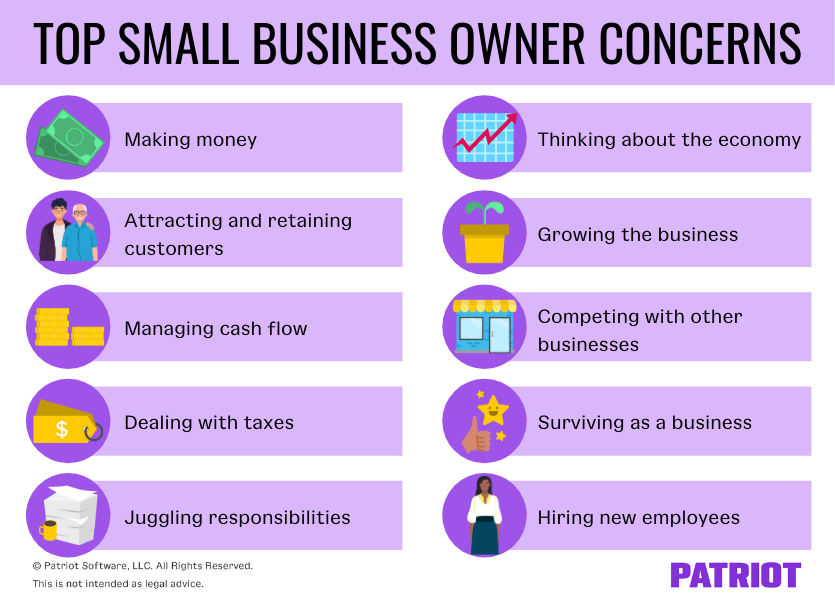As a business owner, you pour your heart and soul into your company. But along with that passion and drive typically come plenty of worries. How am I going to juggle all of my responsibilities? What if my business doesn’t survive another year? If you’re fretting, you’re not alone. Read on to learn the top 10 concerns of small business owners and what you can do about them.
Top 10 concerns of small business owners
You have a lot on your plate as a small business owner. And like many other business owners, there are probably a few concerns that keep you up at night. Let’s address some of these worries, shall we?
In no particular order, here are the top 10 concerns of small business owners just like you.

1. Making money
According to one source, 54% of small business owners worry about money. That means more than half of small business owners let the thought of money keep them up at night. Sound familiar?
Specifically, business owners worry about making enough money. If you’re stressing over the thought of how much money your business is making, consider the following:
- Doing more market research
- Utilizing new marketing tactics
- Analyzing your financial statements
- Cutting costs
- Seeking help from a financial advisor
2. Attracting and retaining customers
Attracting and retaining customers go hand-in-hand. You can’t retain customers if you don’t attract them in the first place. With how difficult it can be to attract, acquire, and retain customers, it’s no surprise that this is something business owners worry about.
To attract and retain customers, you not only need to have a great product or service, but you also need to build relationships. And, building said relationships takes time and money.
Get to know your customers and their needs. To get more customers through your doors, connect with them as much as you can, and show them that you want and appreciate their business. Respond to customer inquiries quickly, be approachable and relatable, start conversations on social media, participate in events … you get the picture.
There are a number of ways to build your brand up and get people interested in what you have to offer. But, they all start with you making a move. Don’t let your worry get in the way of attracting and retaining customers.
3. Managing cash flow
Managing cash flow is a real stressor for some business owners. In fact, 63% of business owners fret about cash flow. Are you one of them? If so, don’t stress. Keep a close eye on your cash flow instead.
Your cash flow is the amount of money going in and out of your business. And as a business owner, you want a healthy cash flow.
To keep your cash flow healthy, you need to pay close attention to it. Start putting your mind at ease about your business’s cash flow situation by staying on top of your cash flow weekly (or even daily). The more you review your cash flow, the easier it will be to pinpoint problems before they snowball out of control.
If you want to get your cash flow under control and in healthy territory, you can make it easy for customers to pay, offer discounts for early payment, send out invoices immediately, and use accounting software.
4. Dealing with taxes
Another top small business owner concern is dealing with taxes. Let’s be honest here … no business owner likes having to keep up with tax and payroll regulations. But, it’s all part of the job.
To keep tabs on tax rules and ensure you’re compliant, consider subscribing to tax-related newsletters (e.g., payroll blog), visiting the IRS website frequently, or consulting an accountant.
To ensure you pay your tax liability on time and avoid any penalties, you can:
- Get a head start before your taxes are due
- Set reminders for your business tax return due date
- Keep your tax liability amount in a separate bank account
5. Juggling responsibilities
One thing that may keep you up at night as a small business owner is the thought of the millions of tasks you need to do. From marketing to managing employees to handling finances, you have a lot of responsibilities to juggle—and so little time.
So, how do you keep this worry at bay? The answer: time management (and probably a whole lot of coffee). If you’re tackling a number of tasks on a daily basis, you need to learn how to multitask and manage your time.
To improve the way you manage your precious time, consider using a to-do list to keep track of tasks, tracking how much time you spend on each task, and planning ahead. To effectively manage time, you can also focus on one task at a time instead of scrambling to complete them all at once.
6. Thinking about the economy
The economy can play a major role in the success of a small business. And, small businesses are typically the ones hit hardest during recessions and economic downturns. No wonder why 31% of business owners worry about it.
As a small business owner, you can’t really predict the economy’s future. But, you can prepare yourself for the worst and be adaptable. To give yourself some peace of mind when it comes to the topic of economy, you can:
- Stay up-to-date on industry trends
- Keep on top of national and international business news
- Set up social media and Google alerts for economy-related info
In addition to being well-informed about what’s going on with the economy, you can protect your business from a recession or economic downturn by setting up a cash reserve (aka emergency fund) to help cushion the blow.
7. Growing the business
Your business is your baby. You want it to grow and prosper as it gets older. But the thought of growing your business can be worrisome.
When it comes to growing your business, you need to realize you are going to make mistakes along the way. But, those blunders are what help you and your business blossom into something even better.
Also worried about whether or not your business will grow at all? That’s OK, too. When it comes to the thought of growing your business and where your company will be in X years, don’t fret. Instead, sit back, enjoy the ride, and learn from your mistakes. After all, your business can’t grow without making a mistake or two.
8. Competing with other businesses
If you’re like other business owners, your competition is probably always lingering in the back of your mind. You may constantly ask yourself questions like, How can I keep up with my competition? How can we show our customers that we’re different than other businesses?
If you want to stand out among your competitors, figure out what makes you different and completely own it.
Monitor your competition to find out what marketing strategies they’re using, what their prices are, and who’s buying from them. You can also find out where they’re falling flat by completing a SWOT analysis. Use the gaps your competitors aren’t filling to your company’s advantage.
9. Surviving as a business
Coronavirus or not, one of the top small business owner concerns is surviving as a business. Why, you ask? Well, it doesn’t help that one-fifth of new businesses fail during the first two years of being open. And, 45% fail during the first five years.
Sure, this worry may always be in the back of your mind, no matter how successful your company is. But, there are things you can do to steer clear of business failure.
If you want your business to thrive for many more years to come, you can:
- Develop a strong business plan
- Avoid high debt
- Keep detailed records
- Plan for the future
- Learn from your competitors
- Manage cash flow efficiently (ahem, #3 on our list)
- Set and track goals
10. Hiring new employees
Your team can make or break how successful your company is. After all, your employees are the backbone of your business. This is why another small business owner worry is hiring new employees.
A lot goes into hiring a new employee for your team. Advertising the position, recruiting candidates, sifting through resumes, and going through multiple interviews to find the perfect new hire can be exhausting. But, you shouldn’t let it stress you out.
Instead of worrying about the hiring process, come up with a gameplan to find top talent and keep your hiring stress-free and organized. Consider creating your own hiring process checklist to organize your steps.



